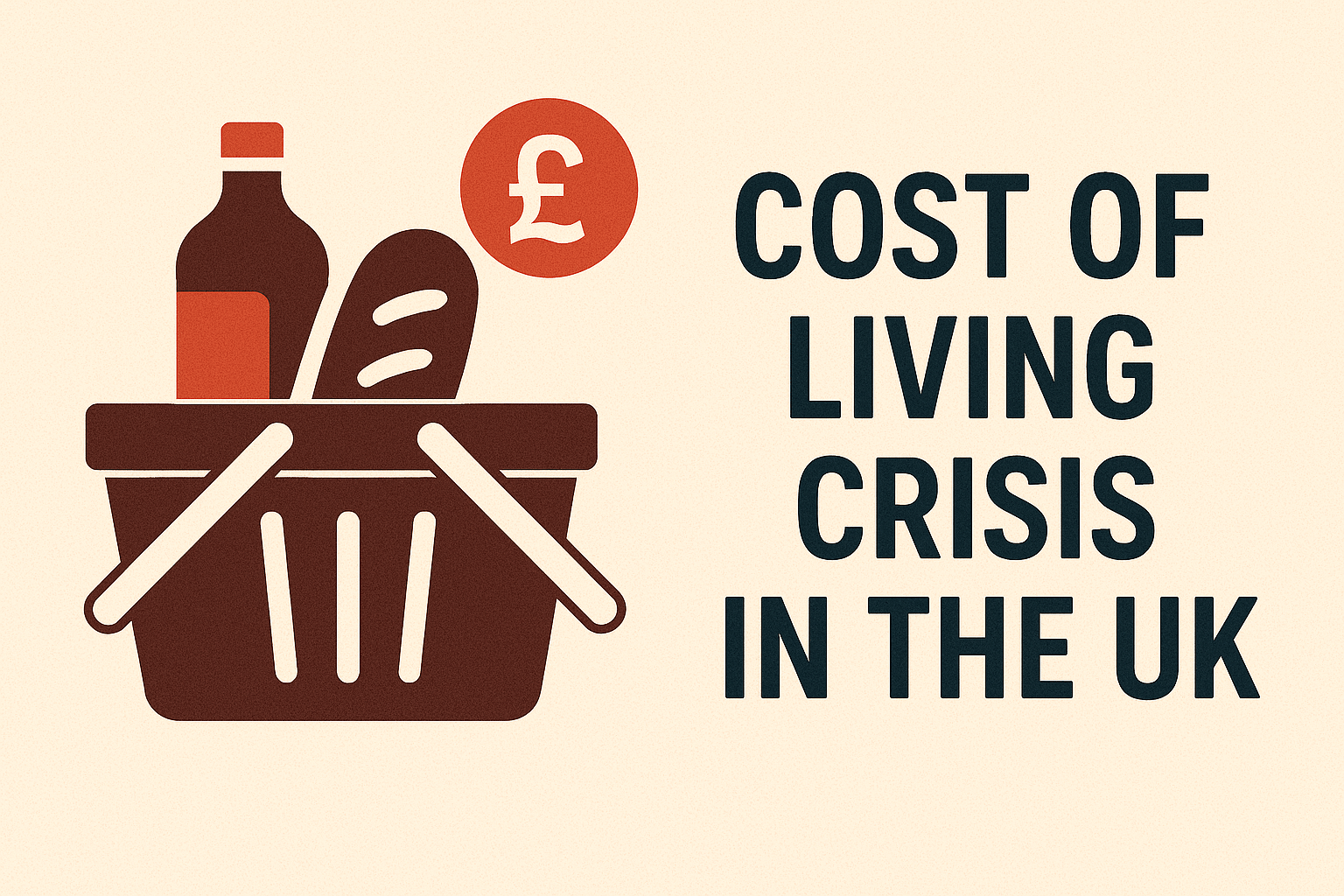Your cart is currently empty!
Cost of Living Crisis in the UK: How Prices Are Rising

The UK is facing one of the most prolonged and painful cost of living crises in decades. Rising energy bills, food prices, housing costs, and transportation expenses are not just headlines—they are daily struggles for millions of families and businesses. As the founder of RajeevPrakash.com, I have been closely monitoring how economic pressures impact everyday lives across the country. This article breaks down the key drivers of the crisis, how it affects individuals and companies, and what to expect in the coming months.
What is the Cost of Living Crisis?
The cost of living crisis refers to a sustained period where the prices of essential goods and services—such as food, energy, housing, and transport—rise faster than household incomes. This results in reduced purchasing power, higher debt burdens, and increased financial stress for the average person.
In the UK, the crisis began intensifying around 2021 and has continued well into 2025. Inflation, driven by global supply chain issues, energy shortages, and geopolitical tensions, has remained persistently high. While salaries have seen some increases, they have not kept pace with inflation—causing real incomes to shrink.
How It Affects Households
Across the UK, families are finding it harder to make ends meet. Essentials that were once manageable within a monthly budget—groceries, rent, utilities—now consume a larger portion of disposable income.
- Energy Bills: Many households are paying hundreds of pounds more annually for electricity and gas. Even with government subsidies and energy caps, costs remain elevated.
- Food Inflation: Weekly grocery bills have surged. Items like bread, milk, and vegetables have seen double-digit price increases, forcing families to cut back or shift to lower-quality alternatives.
- Housing: Renters face sharp increases, especially in urban centers, while mortgage holders on variable rates are squeezed by rising interest rates.
- Transport: Fuel prices and public transport fares continue to rise, affecting commuters and low-income workers most.
As a result, more people are turning to food banks, postponing medical treatments, and cutting out leisure spending entirely.
The Impact on UK Businesses
UK cost of living crisis is also a business crisis. When consumers cut spending, businesses—especially small and medium enterprises (SMEs)—suffer.
- Retail and Hospitality: These sectors are seeing reduced footfall and shrinking basket sizes as people prioritize only the basics.
- Labour Costs: Businesses are under pressure to raise wages to help staff cope with inflation, increasing operational costs and squeezing margins.
- Energy Costs: Energy-intensive businesses, such as manufacturing and food processing, face unsustainable bills that threaten closures or layoffs.
- Supply Chain Disruptions: Higher transportation and import costs add to product pricing challenges, reducing competitiveness.
The crisis forces business owners to make difficult decisions: whether to raise prices, absorb losses, reduce staff, or shut down altogether.
Psychological Toll and Social Impact
Beyond the numbers, UK cost of living crisis is causing a profound mental health and social impact across the UK.
- Stress and Anxiety: Rising bills and stagnant wages have triggered a spike in financial stress and anxiety-related illnesses.
- Child Poverty: Families are increasingly unable to provide nutritious meals or educational support, worsening long-term inequality.
- Community Strain: Local services are stretched, and charitable organizations report record demand for aid.
When basic needs become unaffordable, society suffers as a whole—not just financially, but emotionally and socially.
Government and Policy Response
While some policy measures have been introduced—such as energy subsidies, one-time payments to low-income households, and targeted tax breaks—they have not been enough to eliminate the deeper structural issues.
The UK government faces tough choices: how to balance fiscal discipline with compassionate support. Investments in housing, energy infrastructure, and wage support could ease the crisis but require bold long-term thinking.
Meanwhile, the Bank of England’s interest rate policies play a crucial role in managing inflation, but they also raise borrowing costs, which affects consumers and businesses alike. For more on this, read our article on Inflation and Interest Rates.
Looking Ahead: Recovery or Prolonged Strain?
The outlook depends on multiple factors:
- Inflation Control: If inflation continues to cool, it may bring some relief to households and businesses alike.
- Wage Growth: Sustained, real wage growth is essential to restoring balance between earnings and expenses.
- Energy Prices: Long-term solutions like renewable energy investment and better energy efficiency can reduce pressure.
- Housing Reform: Addressing rent controls, affordable housing, and mortgage relief could ease one of the biggest burdens on families.
However, if inflation resurges or economic growth slows, the cost of living crisis could deepen. For broader context on this scenario, see our full article on Recession Risk and Economic Growth in the UK.
What Can Individuals Do?
In this climate, it’s important to:
- Budget Wisely: Track spending and prioritize essentials.
- Maximize Income: Look for side income opportunities or government grants where available.
- Avoid High-Interest Debt: Credit card interest and payday loans can deepen financial distress.
- Stay Informed: Follow economic updates, government policies, and relief programs.
The cost of living crisis may feel overwhelming, but with knowledge and careful planning, you can regain some control.
Conclusion: A Shared Struggle, A Shared Responsibility
UK cost of living crisis is not just a temporary hardship—it is a wake-up call. It highlights systemic imbalances in wages, housing, energy, and social policy that need addressing urgently.
Whether you’re a consumer trying to make ends meet or a business owner facing higher costs and reduced demand, you’re not alone. At RajeevPrakash.com, we are committed to providing clear, timely, and practical insights into economic realities that matter most.

Mr. Rajeev Prakash
Rajeev is a well-known astrologer based in central India who has a deep understanding of both personal and mundane astrology. His team has been closely monitoring the movements of various global financial markets, including equities, precious metals, currency pairs, yields, and treasury bonds.
